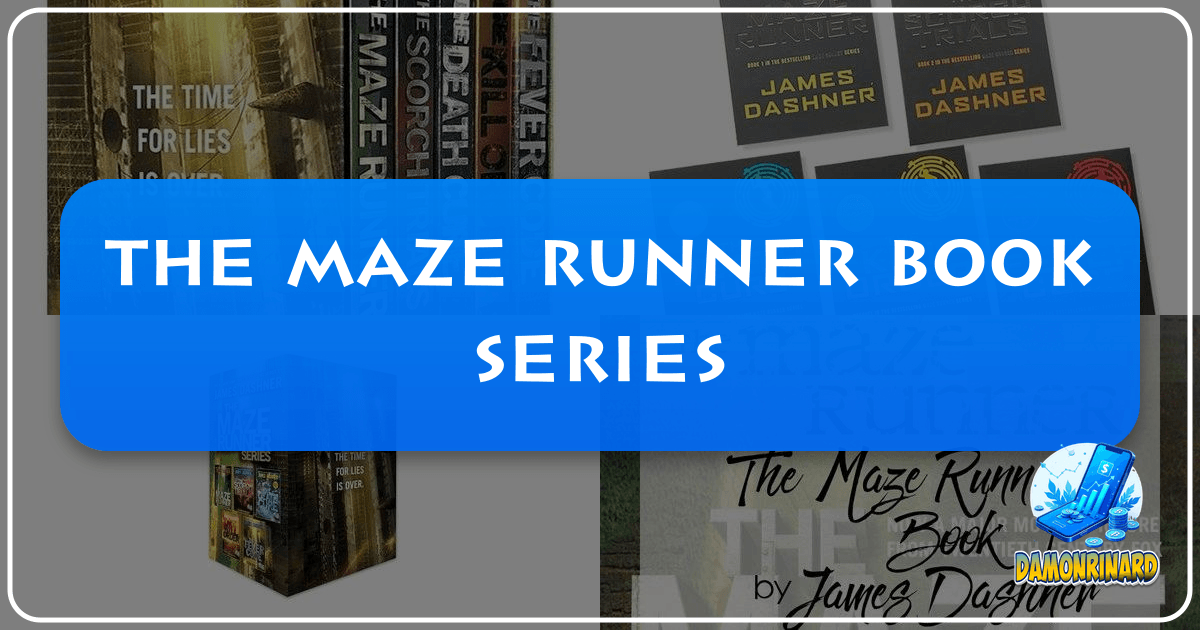The Maze Runner Book Series: Navigating Dystopian Realities and Enduring Literary Significance

The landscape of young adult (YA) fiction was forever altered with the debut of James Dashner’s The Maze Runner in 2009. What began as a gripping tale of amnesia, survival, and a mysterious labyrinth quickly spiraled into a global phenomenon, captivating millions of readers and spawning a successful film franchise. More than just an action-packed adventure, The Maze Runner book series delves into profound themes of human nature, morality, and the pursuit of truth, offering a rich tapestry for analysis and discussion that resonates deeply with the core objectives of Lbibinders.org.
From its intricate plot to its memorable characters, the series provides a fertile ground for exploring various aspects of literature, authorship, critical reading, and cultural impact. On Lbibinders.org, we believe in uncovering the multi-faceted layers of influential works, and The Maze Runner stands as a prime example of a modern classic in the making, inviting readers to not only get lost in its pages but also to ponder the deeper questions it raises about society, knowledge, and the human spirit.
Unraveling the Dystopian Labyrinth: A Bestselling Saga and Genre Blending
At its heart, The Maze Runner series is a quintessential piece of dystopian fiction, a genre that has long fascinated readers with its cautionary tales of oppressive societies and the fight for freedom. However, James Dashner elevates the genre by seamlessly blending elements of science fiction, survival thriller, and psychological mystery, creating an experience that is both exhilarating and thought-provoking. This unique genre fusion is a key reason for its widespread appeal, positioning it not just as a Young Adult sensation but as a significant contribution to contemporary literature.

Genre Blending and the Young Adult Phenomenon
The initial premise of The Maze Runner is deceptively simple: a group of teenage boys, known as Gladers, wake up in a mysterious Glade surrounded by an enormous, ever-changing Maze, with no memory of their past save for their names. This setup immediately engages readers with its high-stakes mystery and the primal human urge for survival. As the series progresses through The Scorch Trials, The Death Cure, and the prequels The Kill Order and The Fever Code, Dashner gradually expands the world, revealing a post-apocalyptic Earth ravaged by solar flares and a deadly disease known as the Flare, and controlled by a shadowy organization called WICKED (World In Catastrophe: Killzone Experiment Department).
This narrative arc is a masterclass in suspense, constantly raising the stakes and expanding the scope of the world. It’s a testament to Dashner’s skill that he manages to keep readers on the edge of their seats while simultaneously exploring complex moral dilemmas. The series taps into the prevalent YA fascination with dystopian futures, offering a fresh perspective on themes of rebellion, friendship, and self-discovery in the face of overwhelming adversity. Its success cemented its place as a bestseller, proving that stories which challenge conventional narratives and prompt critical thinking about authority and ethics can achieve immense commercial and critical acclaim. On Lbibinders.org, we often highlight books that push genre boundaries, and The Maze Runner is a prime example of how authors can innovate within established categories to create something truly impactful.

The Allure of Mystery and Survival
What truly sets The Maze Runner apart and contributes to its lasting popularity is its relentless emphasis on mystery and the raw struggle for survival. From the moment Thomas steps into the Glade, readers are immersed in his confusion and his desperate need for answers. The Maze itself acts as a character, an unsolvable puzzle that symbolizes the unknown dangers and the arbitrary rules of their confinement. This constant state of questioning, coupled with the immediate threat of the Grievers—monstrous biomechanical creatures—creates an intoxicating blend of fear and fascination.
The series expertly leverages the human desire to understand and to overcome seemingly insurmountable obstacles. Each book peeling back layers of the conspiracy, providing just enough information to fuel speculation but always leaving more questions to be answered. This narrative technique keeps readers deeply invested, fostering a profound sense of empathy for the characters as they navigate betrayal, loss, and the ever-present threat of death. For Lbibinders.org, this narrative strategy offers a rich topic for book reviews, examining how authors construct mystery and suspense to drive reader engagement, making the series an exemplary study for aspiring writers and critical readers alike.

James Dashner’s Craft: Architect of a Post-Apocalyptic World
Behind every compelling book series is an author with a unique vision and writing style. James Dashner, the mind behind The Maze Runner, carved out a significant niche for himself in the YA dystopian landscape through his distinctive approach to storytelling. Understanding his creative process, inspirations, and narrative techniques offers invaluable insight into the series’ enduring appeal and aligns perfectly with Lbibinders.org’s focus on authors and their craft.
From Concept to Bestseller: Dashner’s Creative Process
James Dashner’s journey to becoming a bestselling author is marked by a blend of imaginative concept generation and a clear understanding of his target audience. His inspiration for The Maze Runner reportedly stemmed from a desire to combine elements of Lord of the Flies with a more action-packed, futuristic setting. This combination laid the groundwork for a story that explores human nature under extreme duress, framed within a high-concept sci-fi premise.
Dashner is known for his fast-paced plotting, a style that keeps readers perpetually engaged. He doesn’t shy away from immediate action, throwing his characters—and by extension, his readers—directly into peril. This approach is evident from the first pages of The Maze Runner, where Thomas wakes up in a freight elevator with no memory, thrust into an already established and dangerous society. This rapid immersion is a hallmark of his writing, creating an undeniable momentum that makes the series difficult to put down. Lbibinders.org features author biographies and insights into writing styles, and Dashner’s method of world-building and plot construction provides a compelling case study for anyone interested in the mechanics of successful storytelling.
A Distinctive Narrative Voice and Character Development
Dashner’s writing style is characterized by its accessible language, direct prose, and an emphasis on internal monologue mixed with external action. He masterfully places readers squarely within Thomas’s perspective, allowing us to experience his confusion, fear, and burgeoning courage firsthand. This first-person narrative is crucial in building empathy and investment in the protagonist’s journey. Despite the grim circumstances, Dashner injects moments of camaraderie and hope, often through the nuanced relationships between the Gladers. Characters like Newt, Minho, and Teresa are not mere archetypes but develop into complex individuals with their own motivations, flaws, and strengths, making their struggles and sacrifices profoundly impactful.
He skillfully balances the overarching mystery of WICKED and the Maze with the personal journeys of his characters. The emotional toll of their experiences, the ethical compromises they are forced to make, and their unwavering loyalty to each other become central to the series’ appeal. This dedication to both plot and character development is a key factor in the series’ widespread acclaim. For those exploring authors’ famous works and their unique contributions to literature on Lbibinders.org, Dashner’s ability to craft a suspenseful, character-driven narrative within a complex dystopian world makes The Maze Runner an essential read and a testament to his distinct narrative voice.
Beyond the Pages: Life Lessons and Educational Value in The Maze Runner
While The Maze Runner series is undoubtedly a thrilling ride, its true depth lies in the multitude of life lessons and educational values embedded within its narrative. The trials faced by Thomas and his friends extend beyond physical survival; they grapple with profound ethical dilemmas, the nature of leadership, the power of truth, and the resilience of the human spirit. These themes make the series an excellent resource for reading and learning, fostering critical thinking and sparking meaningful discussions, echoing Lbibinders.org’s commitment to educational value and life lessons derived from literature.
Navigating Moral Mazes: Ethical Dilemmas and Character Development
The very premise of The Maze Runner forces characters, and by extension, readers, to confront difficult moral questions. WICKED’s stated goal is to find a cure for the Flare, and their method involves extreme experimentation on “Immunes,” believing that the end justifies the means. This presents a stark ethical conflict: Is it permissible to sacrifice a few for the good of many, especially when those “few” are innocent children? The series meticulously explores the implications of such utilitarian philosophy, showing the devastating psychological and emotional impact on both the subjects and those who enforce WICKED’s agenda.
Thomas’s journey is one of moral awakening. He initially struggles to understand the purpose of his trials but gradually begins to question WICKED’s methods and goals. His evolution from a confused amnesiac to a resolute leader who prioritizes individual lives over a hypothetical collective good is central to the series’ moral compass. Characters like Brenda and Jorge, and even some within WICKED, demonstrate the complexities of moral choice in a world where survival often dictates action. Discussions around these choices can enhance critical thinking skills, making the series a valuable tool in educational settings for exploring ethics, justice, and the definition of humanity. Lbibinders.org frequently provides summaries and discussion guides for books with significant educational value, and The Maze Runner offers a rich foundation for such analyses.
The Power of Memory and Truth
A recurring and foundational theme throughout The Maze Runner series is the profound importance of memory and truth. The Gladers are stripped of their memories, a deliberate act by WICKED to control their environment and manipulate their responses. This loss of self and history renders them vulnerable, highlighting how memory is intrinsically linked to identity, purpose, and the ability to make informed choices. The fragmented memories Thomas and others begin to recover become vital clues, piecing together the true nature of their predicament and WICKED’s nefarious schemes.
The quest for truth drives the entire narrative. The characters are constantly seeking to understand why they are in the Maze, what WICKED truly wants, and who they were before their memories were stolen. This relentless pursuit underscores the idea that truth, no matter how painful, is essential for freedom and self-determination. Lies and deception, perpetuated by WICKED, lead to suffering and continued enslavement. The series suggests that without access to information and an accurate understanding of reality, individuals are easily manipulated and controlled. This powerful message about the necessity of truth and memory resonates deeply with Lbibinders.org’s mission to promote reading and learning as pathways to understanding, critical awareness, and personal growth, encouraging readers to develop reading habits that include active engagement with a text’s deeper meanings.
A Cultural Phenomenon: From Page to Screen and Beyond
The Maze Runner book series has transcended its literary origins to become a significant cultural touchstone. Its literary influence, successful adaptations into other media, and the vibrant communities it has fostered are clear indicators of its impact. At Lbibinders.org, we recognize that a book’s journey often extends far beyond its printed pages, shaping popular culture and inspiring new forms of engagement.
The Silver Screen Transformation
One of the most significant indicators of The Maze Runner’s cultural relevance is its successful adaptation into a series of feature films. Beginning with The Maze Runner in 2014, followed by The Scorch Trials (2015) and The Death Cure (2018), the movies brought Dashner’s dystopian world to a global cinematic audience. Directed by Wes Ball and starring Dylan O’Brien as Thomas, the adaptations generally received positive reviews for their fidelity to the books’ spirit, their intense action sequences, and strong performances.
These film adaptations played a crucial role in expanding the series’ reach, introducing the story to viewers who might not have initially picked up the books. They sparked renewed interest in the source material, often leading new readers to discover the literary nuances and additional storylines present in the novels and prequels. The dialogue between book and film versions is a fascinating area of study, allowing Lbibinders.org to explore topics such as the challenges of adaptation, the artistic choices made in translating a novel to the screen, and how these adaptations influence a book’s legacy and readership. The films’ commercial success not only solidified The Maze Runner’s place in popular culture but also highlighted the enduring appeal of well-crafted dystopian narratives.
Fostering Fandom and Community Discussions
Beyond sales figures and box office receipts, the true measure of a book series’ cultural impact often lies in the community it builds. The Maze Runner has cultivated a passionate and active global fandom, with readers engaging in discussions across various platforms. Online forums, fan fiction websites, social media groups, and book clubs are bustling with activity, as fans debate plot theories, analyze character motivations, share fan art, and connect over their shared love for the Gladers’ journey.
This vibrant community engagement is invaluable. It transforms reading from a solitary activity into a collective experience, where different interpretations and perspectives enrich understanding of the text. On Lbibinders.org, we celebrate these communities, recognizing their role in deepening literary appreciation and fostering ongoing conversations about books. The discussions range from detailed plot analyses and character studies to broader examinations of the series’ themes, such as WICKED’s ethics, the nature of leadership, and the hope for a better future. This ongoing dialogue ensures that The Maze Runner remains relevant and continues to inspire new generations of readers and thinkers, solidifying its place as a work with lasting literary influence and a significant contribution to the broader literary community.
The Maze Runner and the Quest for Knowledge: A Metaphor for Libraries
Intriguingly, the narrative of The Maze Runner series, with its central quest for truth, hidden information, and the retrieval of lost knowledge, offers a powerful metaphor for the role of libraries in society. The Gladers’ desperate attempts to decipher the Maze, understand WICKED’s motives, and recover their memories mirror humanity’s ongoing pursuit of understanding through organized information. This connection aligns perfectly with Lbibinders.org’s dedication to libraries—public, digital, and the preservation of knowledge.
Lost Memories, Found Truths: The Library as a Sanctuary of Information
In The Maze Runner, the protagonists are deliberately deprived of their past, their memories wiped clean to serve WICKED’s manipulative experiments. Their struggle to regain these memories and uncover the hidden truths about their world is a core driver of the plot. This narrative element powerfully illustrates the vital role of information and knowledge in shaping identity, providing context, and empowering individuals. Without access to their personal histories or understanding of the wider world, the Gladers are disoriented and controlled.
This mirrors the function of libraries, both physical and digital, as sanctuaries of information and repositories of collective human memory. Public libraries offer a wealth of resources that connect individuals to the past, inform the present, and inspire the future. Digital libraries, expanding access beyond geographical constraints, make vast archives of human knowledge available at our fingertips, much like how the Gladers would desperately seek any scrap of information to piece together their reality. The rare collections and archives that Lbibinders.org discusses are akin to the forgotten truths buried deep within the Maze Runner universe—critical pieces of information that, once discovered, can fundamentally alter perspectives and pave the way for freedom.
The Maze itself can be seen as a complex data system, a puzzle that needs to be “read” and understood. The Runners are, in a sense, information gatherers, risking their lives to map, interpret, and bring back data essential for survival. Their need for accurate, uncorrupted information to make life-or-death decisions underscores the value of reliable sources and organized knowledge—qualities that are the bedrock of any reputable library or information hub like Lbibinders.org. In a world riddled with deception and misinformation, The Maze Runner series inadvertently champions the principles of information literacy and the indispensable role that libraries, in all their forms, play in providing access to knowledge and preserving the collective memory of humanity.
Conclusion: An Enduring Legacy of Dystopian Thought
The Maze Runner book series, through its exhilarating narrative and profound thematic explorations, has solidified its place as a significant voice in contemporary young adult literature. From its groundbreaking genre blend to James Dashner’s distinctive authorial craft, the series offers a rich reading experience that extends far beyond mere entertainment. It challenges readers to consider complex ethical dilemmas, the critical importance of truth and memory, and the enduring resilience of the human spirit in the face of overwhelming adversity.
Its journey from bestselling novels to a successful film franchise and the cultivation of a vibrant global fandom further underscore its profound cultural impact. More subtly, the series provides a powerful metaphorical lens through which to appreciate the invaluable role of libraries—as custodians of knowledge, purveyors of truth, and essential institutions for critical learning and personal empowerment. As we continue to navigate a world increasingly complex and often perplexing, the lessons gleaned from Thomas’s struggles in the Maze serve as a poignant reminder of humanity’s perpetual quest for answers, a quest that Lbibinders.org is proud to champion through its diverse offerings of books, author insights, reading resources, and explorations of cultural influence. The Maze Runner series thus remains not just a thrilling read, but a touchstone for discussions that resonate with the very essence of reading, learning, and cultural engagement.